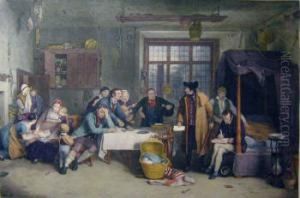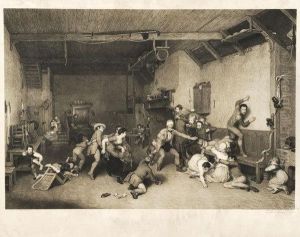Abraham Raimbach Paintings
Abraham Raimbach was a Swiss-born engraver who gained prominence in England during the late 18th and early 19th centuries. Born on February 16, 1776, in Zurich, Switzerland, Raimbach moved to England at a young age. His father, who was also an engraver, likely influenced his decision to pursue a career in the arts. Raimbach initially apprenticed with a Swiss enamel painter in London before focusing exclusively on engraving.
Raimbach’s reputation as an engraver was solidified through his collaborations with British painter Sir David Wilkie. Their partnership was particularly fruitful, with Raimbach producing engravings of many of Wilkie’s famous paintings, such as 'The Village Politicians,' 'The Blind Fiddler,' and 'The Rent Day.' These works were well-received and contributed to Raimbach’s acclaim as an engraver capable of translating the charm and detail of Wilkie’s genre scenes into prints that were accessible to a wider public.
Throughout his career, Raimbach was known for his superb technique and ability to capture the nuances of the original paintings. His engravings are characterized by their fine detail and sensitive rendering of textures and light. As a member of the Royal Academy of Arts, he was highly respected by his peers and played a significant role in the art community of his time.
Abraham Raimbach died on January 17, 1843, in London. He left behind a legacy as one of the foremost engravers of his generation. His works continue to be studied and appreciated for their technical excellence and their role in disseminating the popular British genre scenes of the day to a broader audience.

